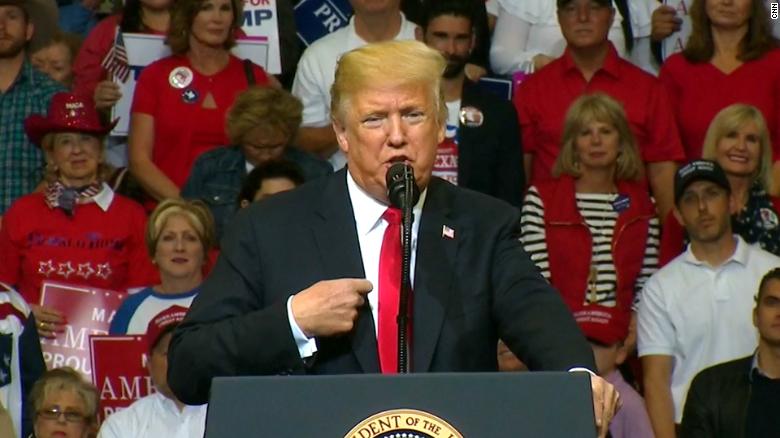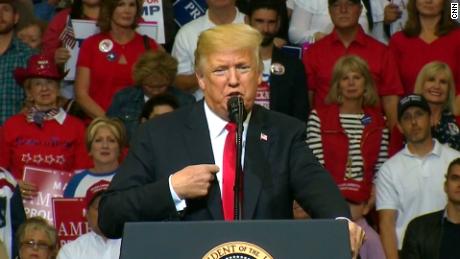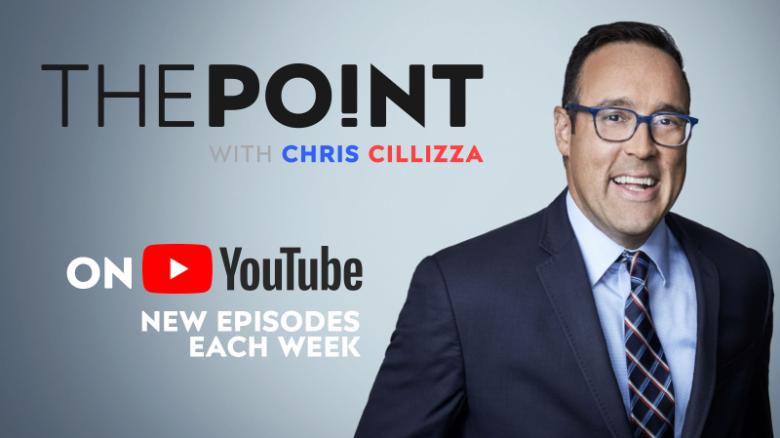(CNN)At a rally in Houston Monday night for Texas Sen. Ted Cruz, President Donald Trump said this:
"A globalist is a person that wants the globe to do well, frankly, not caring about our country so much. And you know what? We can't have that. You know, they have a word. It sort of became old-fashioned. It's called a nationalist. And I say, really, we're not supposed to use that word. You know what I am? I'm a nationalist, OK? I'm a nationalist.
"Nationalist. Nothing -- use that word. Use that word."
Yeah. That happened.
On its face, Trump seemed to simply be saying that while past presidents -- and politicians -- cared a lot about other countries and what other countries thought about the United States (i.e. globalists), that he cares primarily about the US and what is good for us (nationalist).
The problem, of course, is that words matter. And the American president referring to himself as a nationalist has all sorts of problems wrapped up in it.
Let's start with what nationalism means. Here's the definition, from Merriam-Webster (emphasis mine): "a sense of national consciousness exalting one nation above all others and placing primary emphasis on promotion of its culture and interests as opposed to those of other nations or supranational groups."
That part in bold is what makes nationalism different than patriotism. While patriotism, like nationalism, shares a pride and belief in one's own country or values, it doesn't include the idea of promoting your values and culture as inherently superior to those of others. (Here's a good breakdown of the differences between patriotism and nationalism.)
Then there the historical context of the word "nationalism." It primarily conjures two close associations: Nazism and white nationalism.
The roots of Adolf Hitler's rise were built around his emphasis on extreme nationalism -- the idea that the only way Germany could be great again was to seize onto the superiority of the German people and drive out those across Europe who refused to acknowledge that superiority.
White nationalism, which reared its ugly head in Charlottesville, Virginia, last year is organized under the principle that Caucasians are inherently superior and in order for society to truly prosper, the agenda of whites needs to be recognized as a first priority -- at the necessary expense of anyone who isn't white.
Now, do I think that Donald Trump was thinking about all of that linguistic and historical context when he called himself a "nationalist" in Houston on Monday night? Probably not. My guess is he was channeling his one-time political guru Steve Bannon, who serves as the self-appointed leader of what he described as an economic nationalist movement that is rooted in the idea that global elites are squeezing out the average Joe all across the world.
"Brexit, Trump, the elections here in Italy -- they are all pieces of the same thing," Bannon said in Italy in September. "They give the little guy a voice. They reject what the elites have been hoisting onto us. And they show we are tired of hearing that if we want to protect our countries, our way of life, it means we are racists, nationalists and xenophobes."
The big problem with Trump's (and Bannon's) open embrace of nationalism is all of the history and context that comes with it. Nationalism is not a new concept. And history suggests that it has often been used not just to promote pride in one's country and values but also to subjugate those who don't share those values -- sometimes with absolutely devastating consequences.
For those who say Trump just used the word "nationalism" and was totally unaware of all that goes with that idea, I say two things.
First, he's the President of the United States. That means that not only do his words matter but also that he has an obligation to understand the history behind those words. Oops, I didn't mean to suggest what I suggested isn't an excuse a president gets to make.
Second, Trump himself makes clear that he knows that he probably shouldn't call himself a nationalist. Here's Trump: "You know, they have a word. It sort of became old-fashioned. It's called a nationalist. And I say, really, we're not supposed to use that word." That quote should put to rest the idea that Trump didn't know what he was doing with his word choice. He knew -- and said! -- that he probably shouldn't use the word, but did so anyway.
Like what you're reading?
Check out the latest analysis from The Point with Chris Cillizza:
- Trump said Californians are rioting over sanctuary cities. They aren't.
- Melania Trump totally changed her story on the jacket
- The definitive ranking of 2020 Democrats
- This week in politics, GIF'd
Look, I get that Trump sees moments like the one last night in Houston as a chance to flout political correctness, to "own the libs" by purposely jabbing at their easily offended natures. And I get that the crowd gathered for a Trump rally loves when he does just that. (Following Trump's insistence that he was a nationalist, an extended "USA!" chant broke out in the crowd.)
But let me repeat: Words matter. Especially when those words are coming out of the mouth of the President of the United States. Because he knows that calling himself a nationalist will get the crowd going, Trump uses the word.
But, as President, he should realize that when he embraces an ideology with such incredibly negative historical (and current) connotations, he plays a very dangerous game with few possible positive outcomes for the country at large.
The fact he doesn't speaks volumes about his lack of understanding that the presidency isn't just a job but a beacon of moral leadership both in the country and in the world.




















